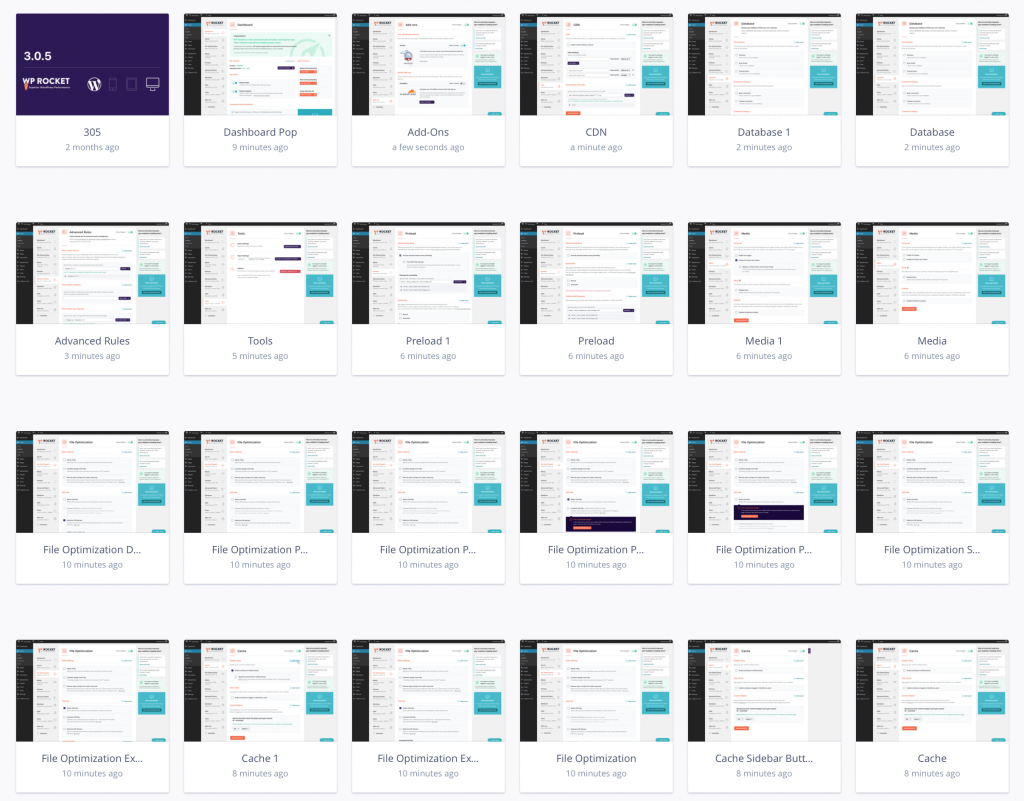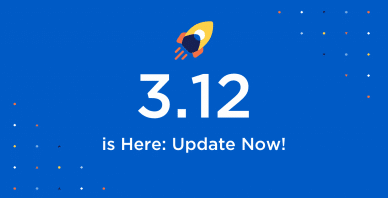Table of Contents
Last update on
The long-awaited moment of the year has come: WP Rocket’s anniversary! This is the perfect occasion to look back at these past months and share some feedback with you.
This year, WP Rocket is 5 years old. After a 3rd year which broke many records and a 2017 focused on reinforcing our figures, team and product, 2018 is already characterised by a lot of changes.
Let’s start with the retrospective of the past year.
A brand-new user experience
With WP Rocket 3.0, we wanted to respond to the feedback we received from our users: providing a more optimized, easier and faster to use settings dashboard.
Our complimentary plugin Imagify has had a nice interface since its launch, so we wanted to bring the same premium plugin experience to WP Rocket’s customers.
We created a special team for the occasion and all the members worked together for several months on this new version.
Several interviews and extensive research on the UX resulted in a more modern design and a new stylish look for the interface. 
We are also very happy to offer our customers:
- a new dashboard
- revamped tabs and options
- Rocket Add-Ons
- and better access to our documentation
And of course, our mission hasn’t changed, we still want to boost your WordPress websites: with this interface, we’re able to make WP Rocket’s configuration even faster.
This new 3.0 version was released last April, and you can discover all the details around it in this dedicated article. Don’t shy away from sharing your feedback about our new interface!
Creating a Product Team
When a new product is launched, one or more developers are usually involved; then a Support Team devoted to answering customers’ questions enters the game.
After the first years, we asked ourselves how could we go one step further and offer our users a better experience with WP Rocket. How to stay tuned to their needs, while increasing the frequency of our releases? How to improve our product versions and support our developers?
To answer these questions, we created a team of people with new complementary profiles.
We started by recruiting a Product Owner, Jared, who joined us in May.
His main mission is to define and lead WP Rocket’s new versions: he creates backlogs, follows the release, analyzes data, etc… He takes care of all the necessary steps to carry out new versions of our plugin. In a strong collaboration with the founders, the Developers and the Support Team, he makes sure that our product is aligned to the company’s mission and goals while understanding the market and user needs.
Among his priorities, there’s the delivery of various major and minor versions of the plugin: always bringing more news and compatibility to our customers is essential.
Next, we decided to round off the team with a Product Assistant.
Renee joined WP Rocket’s support team in May 2017. Her empathy towards our clients as well as her talent with communication and organisation, gave her the necessary qualities to be promoted to Product Assistant.
She will be in charge of interviewing our customers, gathering and analyzing their feedback while coordinating the work around translations and documentation.
Issuing new versions and new features leads to the need to test more iterations of WP Rocket before their public releases. That’s why we completed our Product Team with a few teammates focused on quality assurance: the Q/A Team.
Previously, some of our versions were tested by our developers only, while for some others we asked the collaboration of all members of the Support Team.
There was the risk of overlooking some errors since we were mainly focused on our respective jobs. We therefore wanted to standardize these tests, and create a dedicated multidisciplinary team. Of course, this doesn’t mean that other people within the company can no longer perform such tests.
We can’t wait to see the impact our new Product Team will have on WP Rocket and observe the benefits for our customers.
Our Developer Team is getting bigger
To complete our Product Team and iterate faster on WP Rocket, one developer is not enough. Despite his great powers, our lead developer Rémy can’t work on all these versions by himself. To help him, we decided to recruit a new developer and we also proposed to Gregory, lead developer for Imagify, to contribute to the plugin.
With three developers, the next versions of WP Rocket will keep propeling the WordPress sites of our customers!
Understanding and analyzing how our customers use the plugin
In order to improve a product according to the needs of its users, analyzing their behavior is essential.
For WP Rocket, this analysis hinges on the options enabled in WP Rocket and the website’s environment: PHP and WordPress version, list of active plugins, etc.
Since WP Rocket 2.11, released in December 2017, we used MixPanel to implement our ”Rocket Analytics” program. This service allows you to collect that type of data and analyze them.
Of course, to be GDPR compliant, all the data we collect are anonymous and your consent is required to gather them.

List of data that our team will analyze
The idea of setting up this tool comes from a discussion we had: should we remove Cloudflare integration starting from WP Rocket 2.11?
Our opinion about this topic was based on our feelings from the support tickets we had been receiving about it. We wanted to make a decision based on facts and indisputable numbers, so we set up Mixpanel. After collecting data for several weeks, we learned that our Cloudflare integration is used by over 25% of WP Rocket’s customers. It was therefore not possible to remove an essential option.
Thanks to that data, we could also increase the minimum required PHP version from 5.2 to 5.4.
More recently, our next major version (WP Rocket 3.1) will require websites to work with WordPress 4.7 at least.
This also allows us to know which plugins and WordPress themes you use more often: in this way, we can focus our compatibility tests accordingly to your usage.
Sharing those data is crucial for the evolution of WP Rocket. Your support is essential!
Setting up an affiliate system
For several years, we had doubts about the concept of an affiliate program.
How can a visitor make a distinction between a review really praising our product, or another one throwing us flowers just because of a monetary interest? Too difficult.
Once readers spot the affiliate link, they have the right to wonder if the review recommends WP Rocket only because the writer would gain some money over the purchase: they might be left asking themselves if the plugin is really good at the end.
What concerned us the most, was the possibility that people recommend our product only to gain extra money.
But we would like people to be satisfied with our plugin before recommending it.
We have since changed our mind with respect to the affiliate program for two main reasons.
First of all, we have many customers who recommend WP Rocket every day, so it’s time to reward you for that.
Secondly, the quality of the program will depend on the quality of our work: we can dissipate our concerns by validating our affiliates according to our own selection criteria.
Our affiliate system has been online since November 2017.
Until now, we have never communicated officially and publicly about it. The system is in place and we’re taking the time to refine it.
We wish to provide a quality affiliation experience. We carefully validate every application, trying to establish an enduring relationship with our affiliates and being at their disposal in case of questions.
To succeed with that, we hired Alexis who is responsible of affiliates and partnerships. She joined us last April to set up the foundation of our affiliate program and consolidate our relationships with our long-term partners.
We’ll launch an official communication to all our users as soon as we’ll be able to support the volume of new affiliate requests and the follow-up that this task implies.
Next version
We’re pushing ourselves even further with our next major version to help you meet your speed test goals. In WP Rocket 3.1, we’ll be introducing:
- A new One-click Add-on to optimize your Google tracking scripts. Google Analytics and Google Tag Manager scripts can be stored locally to address Leverage Browser Caching recommendations.
- We’ll automatically improve delivery of the WooCommerce Refresh Cart Fragments request, which is known to add loading time to your results.
- Our Combine JavaScript option will now include inline and 3rd Party scripts, further boosting test scores.
We’ve also made enhancements to our code to modernize it and improve compatibility. Look out for more updates soon to come! 😉



